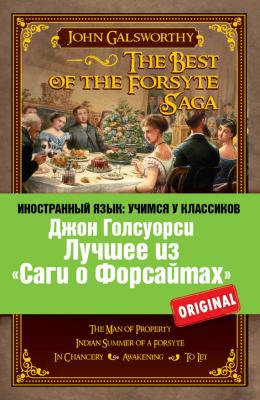Лучшее из «Саги о Форсайтах» / The Best of The Forsyte Saga. Джон Голсуорси
Читать онлайн.| Название | Лучшее из «Саги о Форсайтах» / The Best of The Forsyte Saga |
|---|---|
| Автор произведения | Джон Голсуорси |
| Жанр | Зарубежная классика |
| Серия | Иностранный язык: учимся у классиков |
| Издательство | Зарубежная классика |
| Год выпуска | 0 |
| isbn | 978-5-699-63855-0 |
It did not occur to him to define what he meant by her ‘goings on’; the expression was wide, vague, and suited to a Forsyte. And James had more than his common share of courage after lunch.
On reaching home, he ordered out the barouche, with special instructions that the groom was to go too. He wished to be kind to her, and to give her every chance.
When the door of No.62 was opened he could distinctly hear her singing, and said so at once, to prevent any chance of being denied entrance.
Yes, Mrs. Soames was in, but the maid did not know if she was seeing people.
James, moving with the rapidity that ever astonished the observers of his long figure and absorbed expression, went forthwith into the drawing-room without permitting this to be ascertained. He found Irene seated at the piano with her hands arrested on the keys, evidently listening to the voices in the hall. She greeted him without smiling.
“Your mother-in-law’s in bed,” he began, hoping at once to enlist her sympathy. “I’ve got the carriage here. Now, be a good girl, and put on your hat and come with me for a drive. It’ll do you good!”
Irene looked at him as though about to refuse, but, seeming to change her mind, went upstairs, and came down again with her hat on.
“Where are you going to take me?” she asked.
“We’ll just go down to Robin Hill,” said James, spluttering out his words very quick; “the horses want exercise, and I should like to see what they’ve been doing down there.”
Irene hung back, but again changed her mind, and went out to the carriage, James brooding over her closely, to make quite sure.
It was not before he had got her more than half way that he began: “Soames is very fond of you – he won’t have anything said against you; why don’t you show him more affection?”
Irene flushed, and said in a low voice: “I can’t show what I haven’t got.”
James looked at her sharply; he felt that now he had her in his own carriage, with his own horses and servants, he was really in command of the situation. She could not put him off; nor would she make a scene in public.
“I can’t think what you’re about,” he said. “He’s a very good husband!”
Irene’s answer was so low as to be almost inaudible among the sounds of traffic. He caught the words: “You are not married to him!”
“What’s that got to do with it? He’s given you everything you want. He’s always ready to take you anywhere, and now he’s built you this house in the country. It’s not as if you had anything of your own.”
“No.”
Again James looked at her; he could not make out the expression on her face. She looked almost as if she were going to cry, and yet….
“I’m sure,” he muttered hastily, “we’ve all tried to be kind to you.”
Irene’s lips quivered; to his dismay James saw a tear steal down her cheek. He felt a choke rise in his own throat.
“We’re all fond of you,” he said, “if you’d only” – he was going to say, “behave yourself,” but changed it to – “if you’d only be more of a wife to him.”
Irene did not answer, and James, too, ceased speaking. There was something in her silence which disconcerted him; it was not the silence of obstinacy, rather that of acquiescence in all that he could find to say. And yet he felt as if he had not had the last word. He could not understand this.
He was unable, however, to long keep silence.
“I suppose that young Bosinney,” he said, “will be getting married to June now?”
Irene’s face changed. “I don’t know,” she said; “you should ask her.”
“Does she write to you?”
“No.”
“How’s that?” said James. “I thought you and she were such great friends.”
Irene turned on him. “Again,” she said, “you should ask her!”
“Well,” flustered James, frightened by her look, “it’s very odd that I can’t get a plain answer to a plain question, but there it is.”
He sat ruminating over his rebuff, and burst out at last:
“Well, I’ve warned you. You won’t look ahead. Soames he doesn’t say much, but I can see he won’t stand a great deal more of this sort of thing. You’ll have nobody but yourself to blame, and, what’s more, you’ll get no sympathy from anybody.”
Irene bent her head with a little smiling bow. “I am very much obliged to you.”
James did not know what on earth to answer.
The bright hot morning had changed slowly to a grey, oppressive afternoon; a heavy bank of clouds, with the yellow tinge of coming thunder, had risen in the south, and was creeping up.
The branches of the trees dropped motionless across the road without the smallest stir of foliage. A faint odour of glue from the heated horses clung in the thick air; the coachman and groom, rigid and unbending, exchanged stealthy murmurs on the box, without ever turning their heads.
Конец ознакомительного фрагмента.
Текст предоставлен ООО «ЛитРес».
Прочитайте эту книгу целиком, купив полную легальную версию на ЛитРес.
Безопасно оплатить книгу можно банковской картой Visa, MasterCard, Maestro, со счета мобильного телефона, с платежного терминала, в салоне МТС или Связной, через PayPal, WebMoney, Яндекс.Деньги, QIWI Кошелек, бонусными картами или другим удобным Вам способом.
